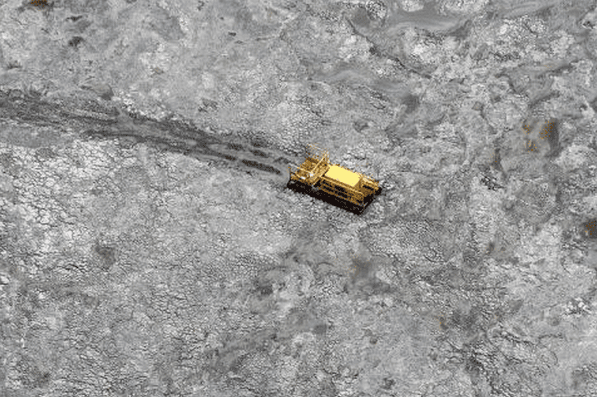Canadian First Nations group raises red flag on proposed oil mining
Canada’s tar sands, also known as oil sands, contain oil that Shell Canada is trying to extract. But doing so comes at an environmental cost. (Photo courtesy of the Sierra Club.)
Canada’s tar sands cover an area the size of New York.
Now Shell Canada wants to expand its Jackpine tar sands mining operations, but several First Nations communities who live there are fiercely opposed to the plans. The Athabasca Chipewyan First Nation has challenged the expansion plans in court.
Chelsea Flook, executive director of the Sierra Club Prairie Chapter, said the Athabasca Chipewyans have multiple complaints with Shell’s plan, including a previous agreement on environmental mitigiation between the two that the nation says the oil company violated.
“When it comes time to making a decision on the new project, how can the First Nation expect any of its concerns to be addressed when, even when you sign a deal with the exact same company, that they don’t honor those agreements,” she said.
The proposed Shell project is open top mining, mining out 21 kilometers of the Muskeg River. Aside from the environmental impacts, the Muskeg holds cultural significance to the Athabasca Chipewyan First Nation people, Flook said.
“They are saying ‘no’ to this project, and they want to be able to assert that right to say no, as it’s been enshrined in the treaty rights and constitutional protections,” she said.
Under the Canadian constitution, the indigenous people of the land that became Canada have certain, special protections, as far as what can be done on their land without their permission. The treaties from which the constitutional protection evolved were signed between the British monarchy and the indigenous people more than 100 years ago, and guaranteed them certain rights so long as the grasses grew and the waters flowed.
The Athabasca Chipewyans argue that Canadian federal officials don’t have the authority to grant Shell’s mining request.
“These projects are having such massive impacts on the land, on the water, on the wildlife that people are still dependent on,” Flook said. “And so they are seeing more and more that their medicines are disappearing, the water levels are getting lower, they’re not sure if it’s safe to eat the fish or drink the water.”
The Canadian Government says there are two independent environmental review panels currently reviewing the project.
“The government trusts that the joint review panels will receive and consider information from Aboriginal groups related to how these projects may affect potential or established Aboriginal and treaty rights before they issue their reports,” officials said in a statement.
But Canada’s history with respect to its First Nations people is mixed, including laws that didn’t let native people vote and mandated certain educational systems that sought to abolish their native way of life. If they are removed from their land, Flook said, “if you can displace them from practicing their traditional ways, then those treaty-like rights no longer exist.”
The stakes in this couldn’t be higher. If a court rules that the federal officials can push these projects ahead without permission of the indigenous people who live on the lands, the federal government would be forced to pay back the mining companies who have leased the land.
Flook says rulings that have been handed down thus far in similar cases give the Athabasca Chipewyan First Nation reason to feel good about their case.
“This could really set a precedent in the tar sands region alone, for more and more of these communities to stand up to these major oil companies and expect that their voices will be heard,” she said.
In published reports, Shell Canada said that, though expanding would cause substantial habitat loss, it has extensive plans to mitigate the damage.
Every day, reporters and producers at The World are hard at work bringing you human-centered news from across the globe. But we can’t do it without you. We need your support to ensure we can continue this work for another year.
Make a gift today, and you’ll help us unlock a matching gift of $67,000!
